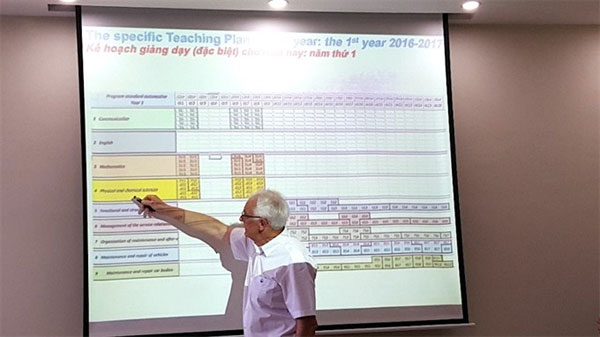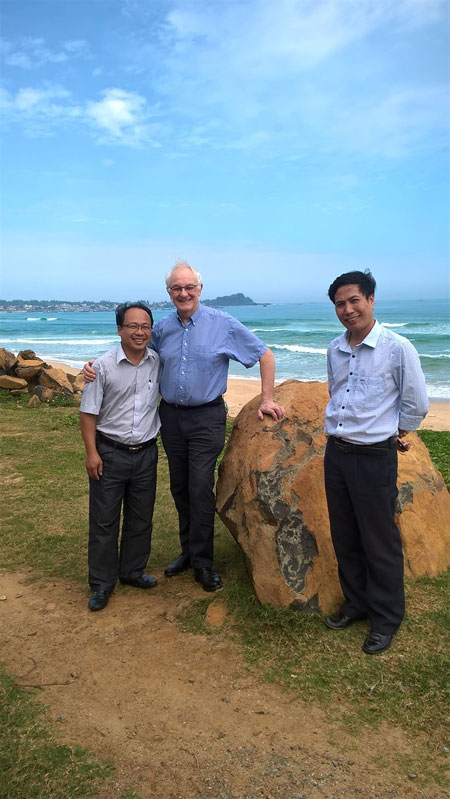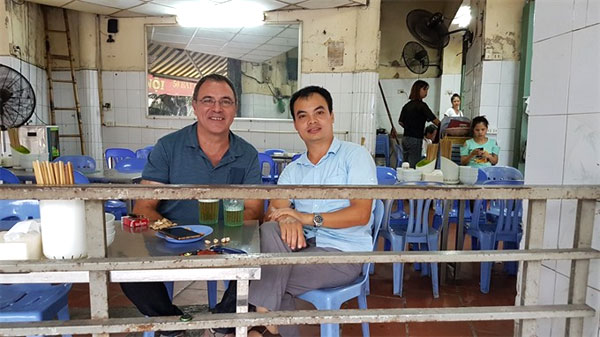VietNamNet Bridge – Though they both come from France, it was in Viet Nam that they met for the first time, as they worked to develop vocational training in the country.

Sharing expertise: Jean-Jacques Diverchy gives training course to teachers in Dung Quat college of Technology in Quang Ngai Province.— Photo Courtesy of Jean-Jacques Diverchy
After many trips from France to Viet Nam over the last two years, Jean-Jacques Diverchy and Francois Sanchez have many Vietnamese friends and a strong attachment to the S-shaped country.
The two experts first came in to the country in 2015. They arrived at Dung Quất College of Technology in central Quang Ngai Province to train Vietnamese teachers and create a new training regime to help develop the vocational training programmes at the higher technician level.
The project is part of a signed agreement between Viet Nam and AFD (French Development Agency) to develop new national training programs in key occupations by transferring and adapting French programs in the fields of welding, metal cutting, automotive, industrial electricity, networks and communications.
Diverchy is in charge of training Vietnamese teachers in the automobile sector and Sanchez in electrotechnics.
Diverchy, coming from the north of France, is an international consultant in pedagogical engineering. He retired from France’s Ministry of National Education, where he spent his career on the education and training of young people.
Sanchez, is a training consultant after many years working as professor in electricity in southern France.
Together they transfer professional expertise to professors at the Dung Quat College of Technology, write course materials that have been applied in the training programme for the college’s students, give practical work and tutorials, and conduct student evaluations.
Investigate the needs of enterprises
According to these experts, teachers should provide vocational training in line with the needs of enterprises, to ensure that students easily find jobs after graduation.
“When we first started the project with the college, in order to create a different training programme, we organised meetings between the college and enterprises to better understand the needs of enterprises. And from this, we compiled our course materials as appropriate to Viet Nam,” said Diverchy.
“When we first came, we asked to visit enterprises and meet the leaders of enterprises. This surprised our Vietnamese interlocutors, who were not familiar with this method, while it seems to us very natural,” the expert recalls.
The French expert said that the biggest shortcoming in vocational training in Việt Nam is the absence of close links between schools and enterprises. For this reason, students often find it hard to find jobs right after graduation, as they must be trained again by employers before they can begin working.
Diverchy says that in France, the vocational training schools are encouraged by the government to create close relations between the school and relevant companies. Specialty teachers visit the companies to offer technical assistance; oversee visits by trainees; and provide continuing education for the company’s employees. Business managers or employees regularly visit vocational training schools to share their own expertise, participate in examinations, and provide technical assistance.
“These relationships have beneficial effects for teachers and their students. They can update technical knowledge and help students discover job offers,” he said.
“With this project, we try to encourage college leaders and their teachers to build this type of relationship,” he said.
Sanchez shares this idea.
“In order to better train the engineers of tomorrow, it is necessary to foster understanding between teachers and technicians of companies. We call them in France, the tutors. Strengthening the link between trainers and tutors could enable them to better complement each other in the common mission of training the personnel of the industrial world of tomorrow,” he said.

Friends abroad: Jean-Jacques Diverchy poses with his two Vietnamese colleagues and friends in Quang Ngai.— Photo Courtesy of Jean-Jacques Diverchy
A better future
2016- 2017 was the first school year that the Dung Quat College of Technology organised high quality vocational training with French curriculum.
Sixty top students at the college were chosen to take part in this training in two sectors: automobiles and electrotechnics.
“These new diplomas were certified by the French authorities, indicating that these diplomas were drawn up in accordance with the same procedures and with the same professional qualification objectives as those of the French professional diplomas (BTS and DUT) of the corresponding courses. This attestation must thus facilitate students going abroad in the pursuit of their studies and in obtaining a first job abroad,” Diverchy explains.
Nguyen Hong Tay, director of Dung Quat College of Technology, appreciates the work of the French experts.
“Their new training programme is very interesting and suitable to our college. Thanks to their support, we find the shortest way for our students to get from school to enterprises. The graduate students will be employed by enterprises at once without any other training session. They also have opportunity to work in Europe,” he says, adding that the 60 selected students have been offered job by different enterprises in the region.

International brews: Francois Sanchez enjoys beer with a Vietnamese colleague and friend in Ha Noi.— Photo Courtesy of Francois Sanchez
Enjoying life in Viet Nam
The project will officially end in December. Sanchez admits that it will be very difficult for him not to come back to Viet Nam often.
“I have friends everywhere in Viet Nam. I miss them already,” he said.
Diverchy said that his total time in Viet Nam is 6 months, with 12 trips in total.
“My working days in Viet Nam were almost entirely devoted to meeting with enterprises, and teachers. True friendship was then created.
When I am in France, we remain in almost permanent contact on social networks. I like my life in Viet Nam and find the same simplicity and kindness as the inhabitants in the north of France,” confides Diverchy.
He will come back to Viet Nam in October for another project in HCM City.
Vuong Bach Lien
VNS